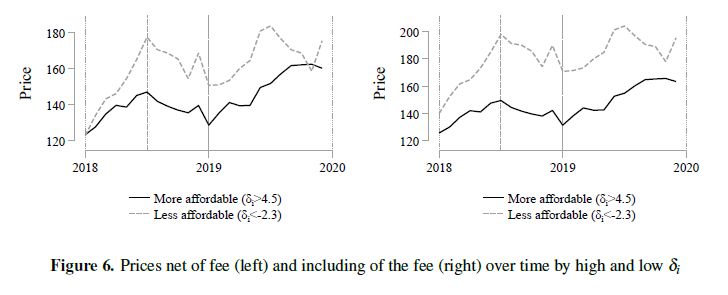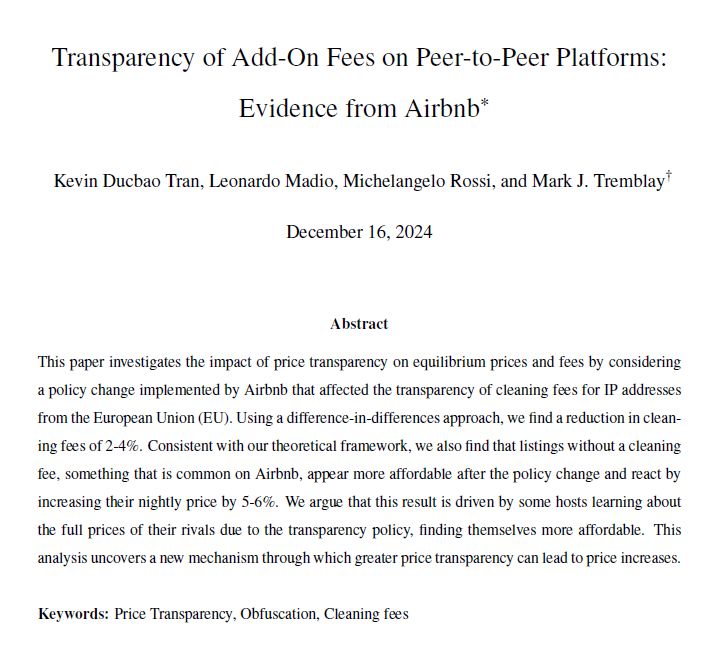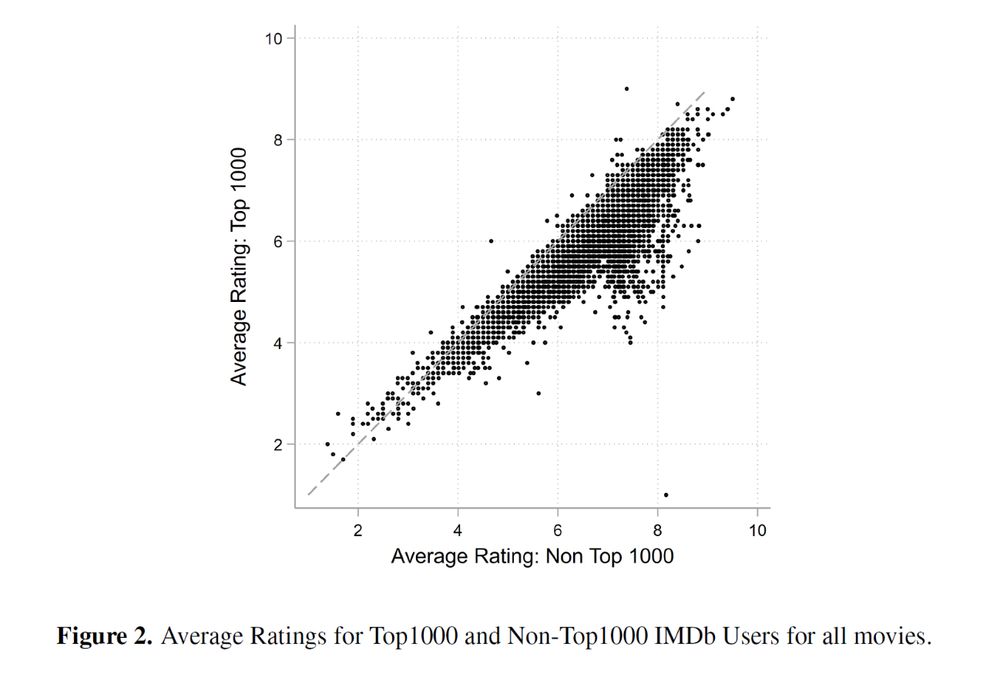🚨Free data alert!! 🚨 Please share.
Large new dataset of Amazon product reviews, including full text and photos and product characteristics, with individual *reviews labeled as fake reviews*.
I believe this is the first publicly available data of this kind.
github.com/bretthollenb...
11.07.2025 21:17 — 👍 125 🔁 43 💬 1 📌 2
Home page - Lavoce.info
Ultimi articoli Lasciamo parlare i dati Fact-checking I commenti dei nostri redattori
📢 Su Lavoce.info con miei coautori @kdbtran.bsky.social @micherossi.bsky.social and Mark Tremblay approfondiamo un tema cruciale per il mercato digitale (partendo da un nostro recente studio empirico): come la trasparenza nelle piattaforme influisce sui prezzi e sull’efficienza del mercato.
03.01.2025 09:41 — 👍 4 🔁 3 💬 0 📌 0
EC 2025 will be held at Stanford from July 7-12. Itai Ashlagi and I are the chairs. The abstract deadline is February 3, and the paper deadline is February 10. The scope is inclusive of many topics across CS, economics, and operations research. Submit your best work!
30.12.2024 20:37 — 👍 39 🔁 20 💬 1 📌 1
My first post on Bluesky! Excited to share my paper with Yixing Chen and Xiaoxia Lei "Trade-offs in Leveraging External Data Capabilities: Evidence from a Field Experiment in an Online Search Market" has been accepted for publication in Management Science! papers.ssrn.com/sol3/papers....
18.12.2024 03:05 — 👍 28 🔁 2 💬 2 📌 2
If only someone had recently published a WP on the impacts of price transparency (at least on peer-to-peer platforms)! @leonardomadio.bsky.social @micherossi.bsky.social
papers.ssrn.com/sol3/papers....
17.12.2024 15:20 — 👍 4 🔁 2 💬 0 📌 1
Holding the supply side fixed, transparency helps consumers and could also reduce overall prices, but if sellers change prices due to the policy, things can get tricky ...
17.12.2024 16:22 — 👍 1 🔁 0 💬 0 📌 0
Thanks! I agree: price increases are not necessarily welfare decreasing (especially for sellers). Moreover, it is hard to measure the reduction of guests’ search costs with more transparency… so any welfare analysis is very complex in this framework
16.12.2024 21:44 — 👍 0 🔁 0 💬 0 📌 0
Policy implications:
Price transparency isn’t universally good or bad. While it reduces search costs and obfuscation, it can also lead to price increases in some cases. Regulation needs to consider both demand-side and supply-side effects carefully.
16.12.2024 12:36 — 👍 1 🔁 0 💬 2 📌 0

The core insight: transparency changes how hosts (not just guests) look at prices. When rivals’ total prices are clearer, hosts adjust their strategies. This is especially impactful in peer-to-peer platforms where pricing frictions exist and some hosts and guests might be naive or have search costs.
16.12.2024 12:36 — 👍 0 🔁 0 💬 1 📌 0
Key results:
• Listings with high cleaning fees reduced them by 2-4% post-policy.⬇️
• But listings without cleaning fees raised their nightly prices by 5-6%.⬆️
Why? Greater transparency let some hosts realize their prices were too low, prompting increases.
16.12.2024 12:36 — 👍 1 🔁 0 💬 1 📌 0

Airbnb hosts set nightly prices and cleaning fees. Before 2019, EU guests only saw cleaning fees at checkout. After a regulatory push, Airbnb made these fees visible upfront. Using a difference-in-differences approach, we studied the impact on prices and fees.
16.12.2024 12:36 — 👍 0 🔁 0 💬 1 📌 0

How does price transparency affect a market?🤔
In our new paper, Kevin Tran, @leonardomadio.bsky.social, Mark J. Tremblay, and I analyze Airbnb’s policy change in the EU, where cleaning fees became fully transparent. The surprising finding: transparency doesn’t lead to lower prices. Here’s why:
16.12.2024 12:36 — 👍 14 🔁 1 💬 1 📌 3
Thanks a lot, Brett!
09.12.2024 21:46 — 👍 1 🔁 0 💬 0 📌 0
📚 Overall, our work sheds new light on how consumer heterogeneity shapes online ratings and offers practical solutions to improve rating systems. We’re excited to see it published in Management Science! (14/15)
#Ecommerce #Ratings #ConsumerBehavior #ManagementScience #DataScience #IMDb #MovieLens
09.12.2024 11:27 — 👍 0 🔁 0 💬 1 📌 0
📊 Our findings have important implications for platform design. By understanding these biases and applying corrections, platforms can deliver more reliable ratings, benefiting consumers and (high-quality) producers alike. (13/15)
09.12.2024 11:27 — 👍 0 🔁 0 💬 1 📌 0
💡 Conversely, simply overweighting the ratings of experienced users, a common practice on several platforms, can actually backfire, further penalizing high-quality movies. (12/15)
09.12.2024 11:27 — 👍 0 🔁 0 💬 1 📌 0
Yes! Once debiasing the ratings, this movie’s rating goes up! In particular, this movie is one of the biggest “winners” of our debiasing procedure. (11/15)
09.12.2024 11:27 — 👍 0 🔁 0 💬 1 📌 0

🎞️ A notable case of this bias? The French movie "The Unknown Girl", selected for the Palme d’Or Cannes in 2016, is rated 6.5 on IMDb. That’s relatively low… but is it due to the fact that most of the raters were experienced, stringent users? (10/15)
09.12.2024 11:27 — 👍 0 🔁 0 💬 1 📌 0
After applying it, the corrected ratings better align with external measures of quality, such as the Oscars and Metacritic scores. It also helped fix those ranking reversals! (9/15)
09.12.2024 11:27 — 👍 0 🔁 0 💬 1 📌 0
🔄 However pervasive, this bias can be undone. We developed an algorithm to de-bias ratings by adjusting for user stringency. Our approach doesn’t require us to take a stance on users’ expertise. Rather, we let ratings and individual stringencies iterate until they converge. (8/15)
09.12.2024 11:27 — 👍 0 🔁 0 💬 1 📌 0
📉 It gets worse. Ratings need not just be compressed, they can actually lead to ranking reversals: in about 8% of cases, lower-quality movies get higher ratings than better ones due to this biased. This further skews future consumer choices! (7/15)
09.12.2024 11:27 — 👍 0 🔁 0 💬 1 📌 0
And since experienced users’ ratings represent a higher share of ratings for higher quality products… IMDb ratings are compressed, that is, they penalize high-quality films compared to their lower quality alternatives. That’s the exact opposite of what we’d like IMDb to do! (6/15)
09.12.2024 11:27 — 👍 0 🔁 0 💬 1 📌 0
A 7 out of 10 from a user with 10000 ratings is harder to obtain than one from a user with 5 ratings! Absent a normalization, we’re comparing apples with oranges. (5/15)
09.12.2024 11:27 — 👍 0 🔁 0 💬 1 📌 0
In other words: experienced users choose better movies on average ➡️ they get used to higher quality, and form higher reference points ➡️ they rate more harshly, for any quality level. (4/15)
09.12.2024 11:27 — 👍 0 🔁 0 💬 1 📌 0

How about ratings' differences between experienced and novice users? This is where it gets interesting. Experience users rate virtually ALL movies more harshly, independent of genre, year, quality, actors, director, and more. (3/15)
09.12.2024 11:27 — 👍 0 🔁 0 💬 1 📌 0
CEPR, established in 1983, is an independent, non‐partisan, pan‐European non‐profit organization. Its mission is to enhance the quality of policy decisions through providing policy‐relevant research, based soundly in economic theory.
VoxEU – CEPR’s policy portal - promotes "research-based policy analysis and commentary by leading economists". VoxEU columns cover all fields of economics broadly defined and are widely read.
Tools for AI-powered research
https://www.expectedparrot.com
Docs: https://docs.expectedparrot.com
GitHub: http://github.com/expectedparrot/edsl
Discord: https://discord.com/invite/mxAYkjfy9m
Blog: https://blog.expectedparrot.com
Associate Professor at the University of Zurich丨Researching the economics of digitization
Professor of Economics at UNSW. Studies roles of culture and institutions in economic development. Organising SIOE 2025 at UNSW. Author of Patriarcapitalisme.
https://sites.google.com/site/paulinegrosjeanperso/home
Assistant Professor at Erasmus University, Rotterdam.
Behavioral Economics, Quant Marketing, Inequality, Gender Identity, Emotions.
https://sites.google.com/site/clementbellet/home
Senior Lecturer (Associate Professor) in Economics at Loughborough University -- curious on topics related to industrial economics and behavioral sciences.
At wired.com where tomorrow is realized || Sign up for our newsletters: https://wrd.cm/newsletters
Find our WIRED journalists here: https://bsky.app/starter-pack/couts.bsky.social/3l6vez3xaus27
Charles W. Eliot Professor and President Emeritus at Harvard, former Secretary of the Treasury for President Clinton
Físico. PhD in Economics at @UC3M. Now @BancoDeEspana
RT&like≠endorsement. Usual disclaimers.
sites.google.com/view/rubenveiga
I am an Assistant Professor (Akademische Rätin) at the Institute for Strategy, Technology, and Organization (ISTO) at the University of Munich (LMU). I love Platforms and Digital Economics.
Assistant Professor at the University of Chicago. Economics Ph.D. from UC3M.
Political Economist. My soul was always for History.
Personal webpage: https://t.co/b9M6GHB6H5
Your voice in the EU 🇪🇺
Updates, news, and insights from the European Parliament - the heart of European democracy.
Privacy policy: https://www.europarl.europa.eu/pdf/data_protection/data-protection-notice-bluesky-en.pdf
Associate Professor
Tufts University Department of Economics
https://www.stevecicala.com
http://goingelectric.substack.com
Assistant Professor of Management Science at Chapman University, Digital Fellow at Stanford Digital Economy Lab.
JEL: J24
she/her/hers
Aspiring wastrel, applied econometrician. At http://rachaelmeager.com for bayes, dev econ and meta science. Also at http://rottenandgood.substack.com for writing, art, death and emotions. Gay academic nonbinary weirdo, cursed to be serious in life.
PhD Research Scholar in industrial organisation at NHH Norwegian School of Economics.
Media markets with multihoming consumers..
https://www.olekristian.dyskeland.no
CESifo is a global, independent research network with members from across the world. Our mission is to advance international scientific knowledge exchange in economics and economic policy.
www.cesifo.org







